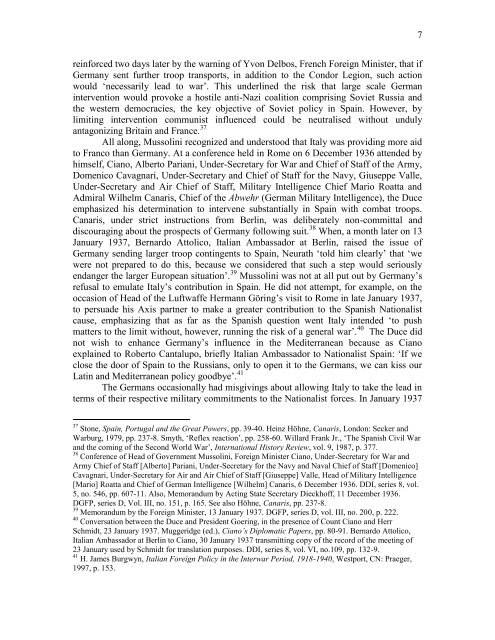Stone, G. (2009) Italo-German collaboration and the Spanish Civil ...
Stone, G. (2009) Italo-German collaboration and the Spanish Civil ...
Stone, G. (2009) Italo-German collaboration and the Spanish Civil ...
You also want an ePaper? Increase the reach of your titles
YUMPU automatically turns print PDFs into web optimized ePapers that Google loves.
einforced two days later by <strong>the</strong> warning of Yvon Delbos, French Foreign Minister, that if<br />
<strong>German</strong>y sent fur<strong>the</strong>r troop transports, in addition to <strong>the</strong> Condor Legion, such action<br />
would „necessarily lead to war‟. This underlined <strong>the</strong> risk that large scale <strong>German</strong><br />
intervention would provoke a hostile anti-Nazi coalition comprising Soviet Russia <strong>and</strong><br />
<strong>the</strong> western democracies, <strong>the</strong> key objective of Soviet policy in Spain. However, by<br />
limiting intervention communist influenced could be neutralised without unduly<br />
antagonizing Britain <strong>and</strong> France. 37<br />
All along, Mussolini recognized <strong>and</strong> understood that Italy was providing more aid<br />
to Franco than <strong>German</strong>y. At a conference held in Rome on 6 December 1936 attended by<br />
himself, Ciano, Alberto Pariani, Under-Secretary for War <strong>and</strong> Chief of Staff of <strong>the</strong> Army,<br />
Domenico Cavagnari, Under-Secretary <strong>and</strong> Chief of Staff for <strong>the</strong> Navy, Giuseppe Valle,<br />
Under-Secretary <strong>and</strong> Air Chief of Staff, Military Intelligence Chief Mario Roatta <strong>and</strong><br />
Admiral Wilhelm Canaris, Chief of <strong>the</strong> Abwehr (<strong>German</strong> Military Intelligence), <strong>the</strong> Duce<br />
emphasized his determination to intervene substantially in Spain with combat troops.<br />
Canaris, under strict instructions from Berlin, was deliberately non-committal <strong>and</strong><br />
discouraging about <strong>the</strong> prospects of <strong>German</strong>y following suit. 38 When, a month later on 13<br />
January 1937, Bernardo Attolico, Italian Ambassador at Berlin, raised <strong>the</strong> issue of<br />
<strong>German</strong>y sending larger troop contingents to Spain, Neurath „told him clearly‟ that „we<br />
were not prepared to do this, because we considered that such a step would seriously<br />
endanger <strong>the</strong> larger European situation‟. 39 Mussolini was not at all put out by <strong>German</strong>y‟s<br />
refusal to emulate Italy‟s contribution in Spain. He did not attempt, for example, on <strong>the</strong><br />
occasion of Head of <strong>the</strong> Luftwaffe Hermann Göring‟s visit to Rome in late January 1937,<br />
to persuade his Axis partner to make a greater contribution to <strong>the</strong> <strong>Spanish</strong> Nationalist<br />
cause, emphasizing that as far as <strong>the</strong> <strong>Spanish</strong> question went Italy intended „to push<br />
matters to <strong>the</strong> limit without, however, running <strong>the</strong> risk of a general war‟. 40 The Duce did<br />
not wish to enhance <strong>German</strong>y‟s influence in <strong>the</strong> Mediterranean because as Ciano<br />
explained to Roberto Cantalupo, briefly Italian Ambassador to Nationalist Spain: „If we<br />
close <strong>the</strong> door of Spain to <strong>the</strong> Russians, only to open it to <strong>the</strong> <strong>German</strong>s, we can kiss our<br />
Latin <strong>and</strong> Mediterranean policy goodbye‟. 41<br />
The <strong>German</strong>s occasionally had misgivings about allowing Italy to take <strong>the</strong> lead in<br />
terms of <strong>the</strong>ir respective military commitments to <strong>the</strong> Nationalist forces. In January 1937<br />
37 <strong>Stone</strong>, Spain, Portugal <strong>and</strong> <strong>the</strong> Great Powers, pp. 39-40. Heinz Höhne, Canaris, London: Secker <strong>and</strong><br />
Warburg, 1979, pp. 237-8. Smyth, „Reflex reaction‟, pp. 258-60. Willard Frank Jr., „The <strong>Spanish</strong> <strong>Civil</strong> War<br />
<strong>and</strong> <strong>the</strong> coming of <strong>the</strong> Second World War‟, International History Review, vol. 9, 1987, p. 377.<br />
38 Conference of Head of Government Mussolini, Foreign Minister Ciano, Under-Secretary for War <strong>and</strong><br />
Army Chief of Staff [Alberto] Pariani, Under-Secretary for <strong>the</strong> Navy <strong>and</strong> Naval Chief of Staff [Domenico]<br />
Cavagnari, Under-Secretary for Air <strong>and</strong> Air Chief of Staff [Giuseppe] Valle, Head of Military Intelligence<br />
[Mario] Roatta <strong>and</strong> Chief of <strong>German</strong> Intelligence [Wilhelm] Canaris, 6 December 1936. DDI, series 8, vol.<br />
5, no. 546, pp. 607-11. Also, Memor<strong>and</strong>um by Acting State Secretary Dieckhoff, 11 December 1936.<br />
DGFP, series D, Vol. III, no. 151, p. 165. See also Höhne, Canaris, pp. 237-8.<br />
39 Memor<strong>and</strong>um by <strong>the</strong> Foreign Minister, 13 January 1937. DGFP, series D, vol. III, no. 200, p. 222.<br />
40 Conversation between <strong>the</strong> Duce <strong>and</strong> President Goering, in <strong>the</strong> presence of Count Ciano <strong>and</strong> Herr<br />
Schmidt, 23 January 1937. Muggeridge (ed.), Ciano’s Diplomatic Papers, pp. 80-91. Bernardo Attolico,<br />
Italian Ambassador at Berlin to Ciano, 30 January 1937 transmitting copy of <strong>the</strong> record of <strong>the</strong> meeting of<br />
23 January used by Schmidt for translation purposes. DDI, series 8, vol. VI, no.109, pp. 132-9.<br />
41 H. James Burgwyn, Italian Foreign Policy in <strong>the</strong> Interwar Period, 1918-1940, Westport, CN: Praeger,<br />
1997, p. 153.<br />
7

















